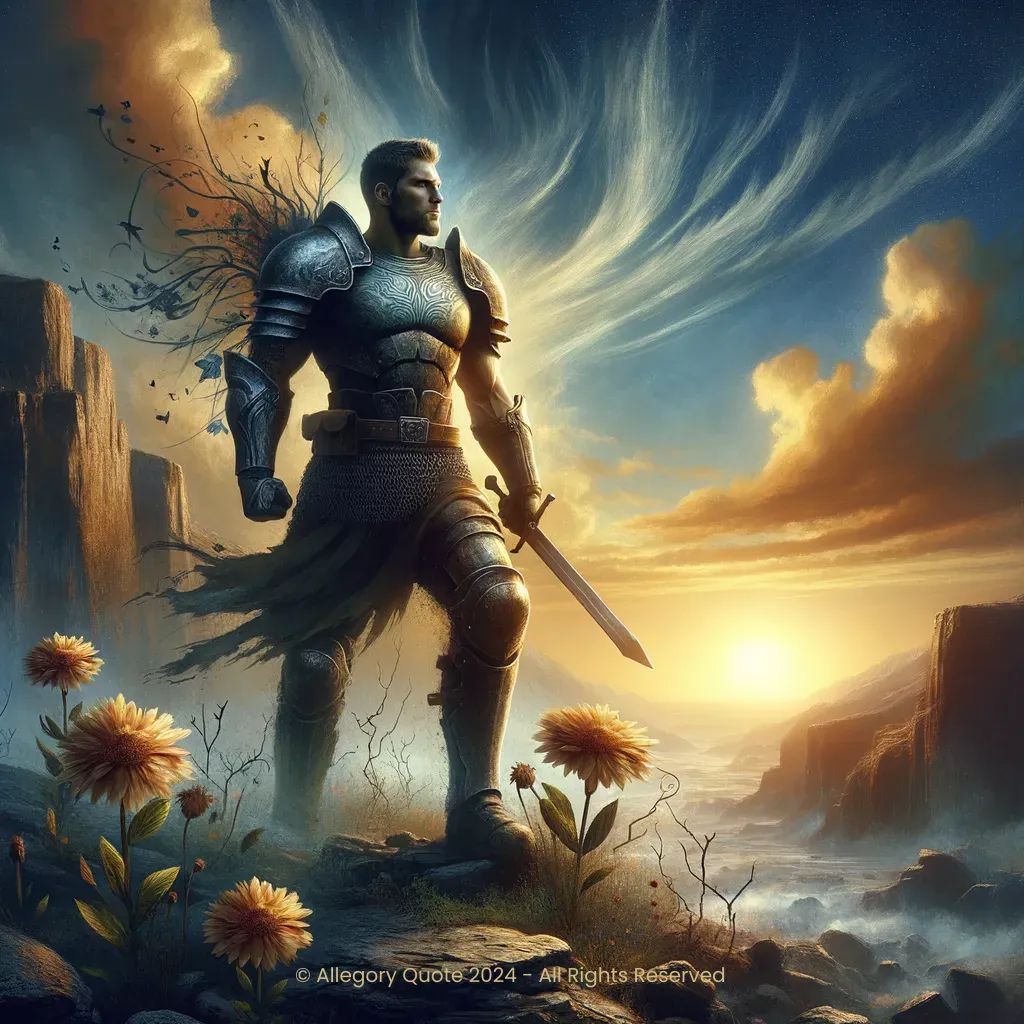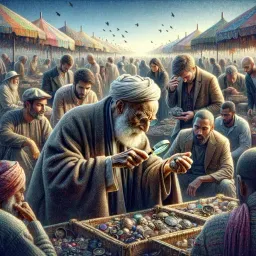Vivere est militare

0
0
0
0
- Meaning
- The interpretation of "Vivere est militare" can be viewed through both philosophical and psychological lenses. Philosophically, the phrase suggests that life is a constant battle, aligning closely with Stoic philosophy, which emphasizes resilience and fortitude in the face of life's challenges. Psychologically, it hints at the human condition of perpetual struggle—for survival, success, happiness, or personal growth. It reflects the idea that achieving anything meaningful often requires enduring hardship and overcoming obstacles.
- Allegory
- The warrior stands as a metaphor for the relentless human spirit, worn by challenges but unbroken. The rugged battlefield represents life's hardships, while his battered armor illustrates the toll of these struggles. The sunrise symbolizes hope and new beginnings, suggesting that after the darkest times, there is always a chance for renewal. Flowers blooming in the barren earth signify resilience and the potential for beauty and growth that arises from overcoming adversity. The clear sky with few clouds symbolizes peace and clarity, hinting at the reward of enduring life's battles. Altogether, these elements harmonize to reflect the phrase "Vivere est militare," encapsulating the essence of living as a persistent fight filled with potential and hope.
- Applicability
- The teaching of "Vivere est militare" can be applied to personal life as a motivator and a reminder of resilience. Whether facing daily struggles or significant life crises, embracing the notion that life inherently involves challenges can help individuals maintain perseverance and mental strength. By accepting that struggle is part of the human experience, one can approach difficulties with a mindset geared towards overcoming them rather than being defeated by them.
- Impact
- "Vivere est militare" has had a significant impact on philosophical thought, particularly within the context of Stoicism. The phrase encapsulates the Stoic ethos of enduring hardship and finding strength in adversity. It continues to resonate in contemporary discussions of resilience, mental toughness, and personal development. The notion has influenced countless individuals and movements that emphasize the importance of perseverance in the face of life's inevitable difficulties.
- Historical Context
- The phrase originates from ancient Roman times, specifically from the works of Seneca the Younger, who lived between 4 BC and AD 65. During this period, Rome was a republic transitioning to an empire, marked by political turmoil, military conquests, and philosophical developments. Seneca himself witnessed the rise and complexities of the Roman Empire and utilized his writings to disseminate Stoic principles amidst such turbulent times.
- Criticisms
- There haven't been significant controversies related to this phrase. However, one could argue against its deterministic view, suggesting that life should encompass more than just struggle and hardship and also celebrate joy, pleasure, and contentment. Critics might posit that framing life purely as a battle can lead to a potentially pessimistic outlook, overshadowing the pursuit of happiness and fulfillment.
- Variations
- Variations of this phrase or its interpretations can be found in different cultures. For instance, the Japanese proverb "Nana korobi ya oki" (Fall seven times, stand up eight) reflects a similar sentiment of relentless perseverance. Different cultures may interpret "Vivere est militare" with nuances that align with their own values and philosophies, but the core message of resilience remains consistent.
-

Vita est militia.
-

Vox populi, vox Dei.
-

Amor vincit omnia.
-

To be, or not to be, that is the question.
-

Aut vincere aut mori.
-

It is not in the stars to hold our destiny but in ourselves
-

Dum spiro, spero.
-

Caveat emptor.
-

At the name of Jesus every knee should bow.
No Comments